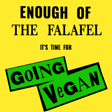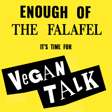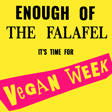
212- Trump administration to end animal testing?!
This week, Dominic brings us the news that the 'Make America Healthy Again' programme, may involve an end to animal testing in the US. He is also joined by Julie, Mark & Anthony, and together they dissect the week's vegan & animal rights news from across the world.
****************
Enough of the Falafel is a community of people who love keeping on top of the latest news in the world of veganism & animal rights. With the Vegan Week podcast, we aim to keep listeners (& ourselves) informed & up-to-date with the latest developments that affect vegans & non-human animals; giving insight, whilst staying balanced; remaining true to our vegan ethics, whilst constantly seeking to grow & develop.
Each week we look through news stories from the past 7 days in the world of veganism & animal rights.
If you spot any news stories that might catch our fancy, or have an idea for a discussion topic, get in touch via enoughofthefalafel@gmail.com.
*******************
This week's stories:
https://www.cbsnews.com/news/marineland-beluga-whales-theme-park-says-may-have-to-euthanize-30-animals/
https://www.psypost.org/people-with-dark-personality-traits-show-less-concern-for-animal-rights/
https://www.abc.net.au/news/science/2025-10-07/humpback-whales-eastern-population-numbers-rebound-estimate/105843256
https://www.theguardian.com/food/2025/oct/04/warnings-imports-caged-hen-eggs-ukraine-poland-uk-biggest-suppliers#:~:text=Eggs-,Warnings%20of%20imports%20of%20caged%20hen%20eggs%20as,Poland%20become%20UK's%20biggest%20suppliers&text=Ukraine%20and%20Poland%20have%20overtaken,back%20door%E2%80%9D%20despite%20welfare%20pledges.
https://vegconomist.com/society/vegan-mres-coming-us-military-rations-2027/
https://www.huntsabs.org.uk/parked-another-beagle-pack-joins-the-club/
https://www.politico.com/newsletters/politico-pulse/2025/10/06/animal-welfare-meets-maha-00594538
https://www.bbc.co.uk/news/articles/crrj4qqqy7po
https://www.foodingredientsfirst.com/news/world-octopus-day-animal-welfare-food-security.html
https://www.bbc.co.uk/news/articles/c3w5v75deewo
****************
Thanks everyone for listening; give us a rating and drop us a message to say "hi"; it'll make our day!
Julie, Mark, Dominic & Ant


